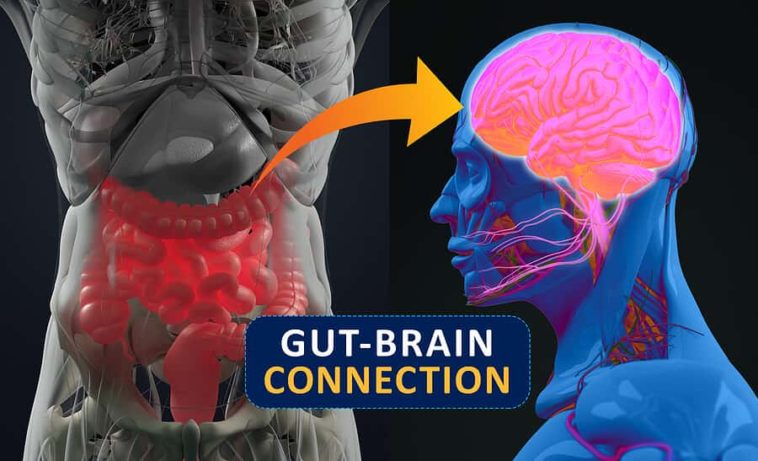You can improve mental health by paying attention to gut health. Recent scientific research offers a great deal of information about how your diet affects your mental health. Here we take a closer look at how the intestinal biome affects not only how we perform physically, but also our emotions, thinking, and mood.
Why Is the Gut Biome So Important?
The intestines contain bacteria that are critical to normal digestive function, as well as for overall health.
At birth, babies have a very simple gut biome, which gradually develops into a more complex system of bacterial biomes as the child grows.
Some intestinal bacteria are beneficial to health, while others are not.
Along the way, the food we consume influences the types of bacteria that are present in the intestinal tract. Researchers are finding that keeping the beneficial bacteria dominant in the intestinal biome helps to maintain good health throughout the body. It also helps our well-being.
What Does Science Say About the Mind/Gut Connection?
Medical professionals have long understood that emotions and stress can affect intestinal health, even contributing to problems such as irritable bowel syndrome and other conditions.
But, the idea that the gut itself can actually trigger emotional states is a new concept.
Many scientists believe the intestines function as a sort of “second brain” that connects directly to the immune system, which helps to fight disease and maintain good health.
Although the gut (aka the enteric nervous system) doesn’t “think” as the human brain does, it does have the ability to cause body reactions that can affect emotions and general health.
How Does the Intestinal Biome Affect Mental Processes?
The lining of the intestinal tract is the site of hundreds of millions of neurons, which are nerve cells that are responsible for producing neurotransmitter chemicals that act as messengers between cells.
The beneficial bacteria in the gut help to protect these neurons so they can provide the chemicals that help to regulate mood. Because of these biochemical processes, gut bacteria are critical to staying emotionally stable.
When unhealthy bacteria dominate the intestines, these chemicals are inhibited and can result in mood swings, anxiety, and depression. In some cases, the risk of substance abuse increases due to trying to “self-medicate” to counteract these emotions.
Can Improving Gut Health Help Mental Health Conditions?
Research that expanded our understanding of the importance of gut health has sparked interest in using food and diet to improve mental health.
Groups that had “traditional” diets that focused on having more fruit and vegetables, whole grains, lean meats, fish, and seafood as well as avoiding sugar, dairy, and processed foods, had significantly lower rates of depression. That’s led to recommendations for dietary changes as a way to lower rates of depression and anxiety and to reduce the need for medications to regulate these conditions.
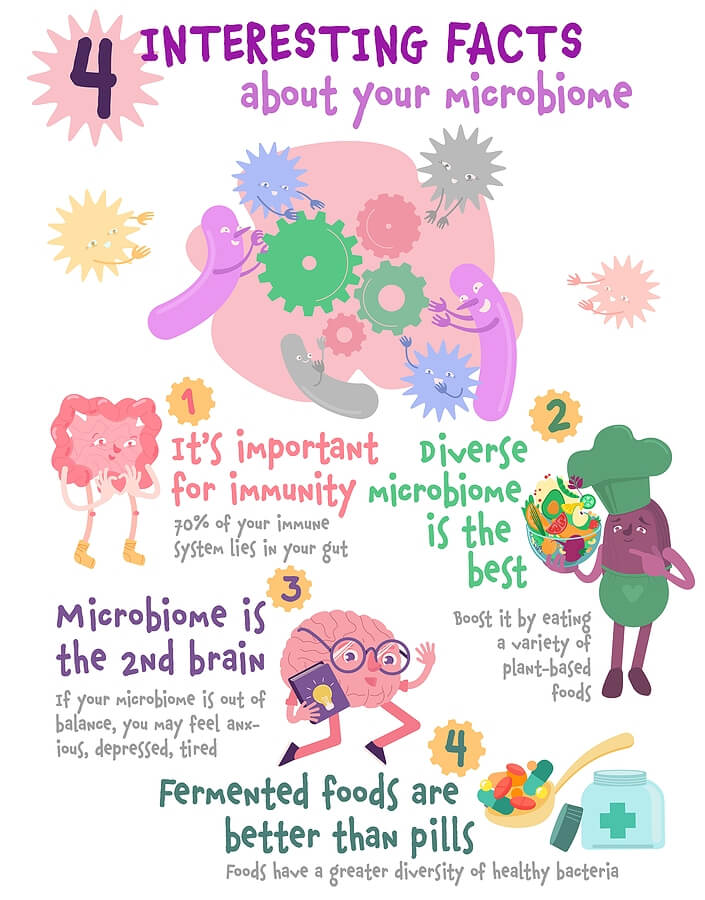
What Foods Improve Gut Health?
Research suggests that fiber is one of the most important elements in maintaining a healthy intestinal biome. Fruits, vegetables, legumes, and grains generally have a large amount of dietary fiber. The fiber found in plants encourages the growth of healthy bacteria in the intestines to promote good health.
Today, people eat a lot of processed foods. These foods have very little fiber, and the intestinal biome contains fewer beneficial bacteria as a result.
Try eMeals Free for 14 Days
Here are the best and worst foods for your gut.
The Best Foods for Your Gut
Let’s start with the best foods for your gut. These are the foods that often contain higher amounts of nutrients, like fiber, probiotics, prebiotics, protein, and many different vitamins and minerals. Of course, some foods on this list you might still be sensitive to if you have conditions like Crohn’s, IBS, or gastritis, but it is a good place to start.
Yogurt
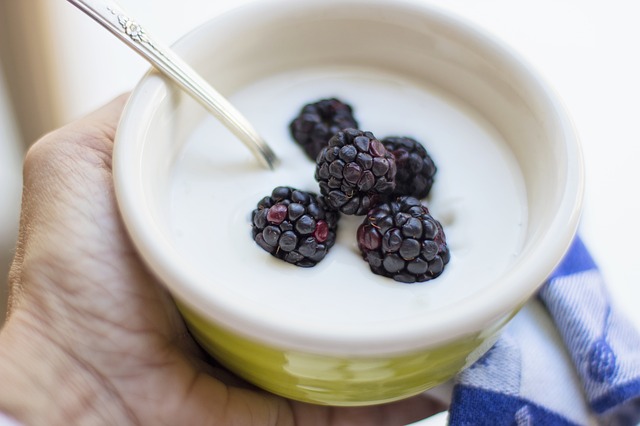
If you can handle dairy, yogurt is one of the best foods to add to your daily routine. Look for yogurt with live cultures, such as Greek yogurt, as it contains a good amount of probiotics to help your gut microbiome. Just a small serving of yogurt a day is all you really need, and you will get that gut-friendly bacteria along with calcium and protein as an added bonus.
Tip – Get the unsweetened varieties of yogurt, then sweeten it yourself with honey or another type of natural sweetener. It will be less processed and you can avoid unhealthy sugars.
Kimchi
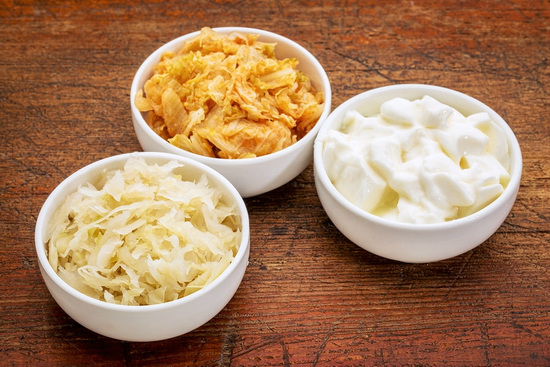
Next up is another type of probiotic in kimchi. If you have never heard of this before, it is a type of fermented vegetable that is popular in Korean cuisine. Many fermented foods will help to balance out the good and bad bacteria in your stomach and improve your digestive system. Plus, it has many other vitamins and minerals, and a good amount of fiber.
Tip – Kimchi tastes great when served with meat or fish. If you are not a big meat eater, try it with your eggs.
Apple Cider Vinegar
This has become a trending topic in recent years, so it’s probably something you are familiar with. There are many health benefits to apple cider vinegar, which is why it is so highly regarded, especially in the alternative and natural health space. But for gut health, it also has some unique benefits.
Apple cider vinegar can help create more hydrochloric acid, which is a type of acid in your gut that allows you to digest carbs and fats more effectively. It is also great for people with GERD or acid reflux.
Tip – Take a shot of apple cider vinegar every morning, mixed with a small amount of water.
Sauerkraut
Another type of fermented vegetable that is amazing for your gut health is sauerkraut. It is made from cabbage that is fermented and can be put alongside many dishes, like sausages, meats, even other vegetables. Like other fermented vegetables, it is a type of probiotic food.
Tip – Top your hot dog or Italian sausage with some sauerkraut.
Fish and Fish Oil

Both fish and fish oil are really good for your gut and the rest of your body. If you have been dealing with digestive issues, adding a serving of fish to your day can help tremendously. You can also use fish oil supplements if you prefer and aren’t a big fan of eating fish.
In addition to the gut benefits, fish and fish oil also contain omega-3 fatty acids, and protein, all of which are great for your health.
Tip – Enjoy salmon or another fatty fish a few days a week to increase the fish oil in your diet.
Ginger
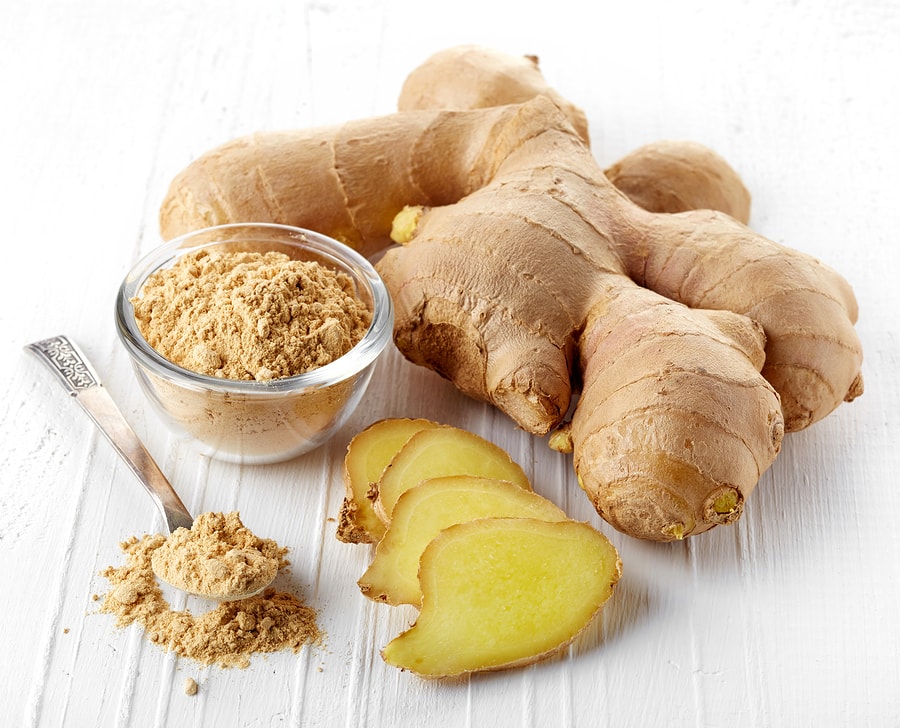
If you have ever tried Ginger-Ale or ginger tea for a tummy ache, then you are already aware ginger has many health benefits. But in addition to helping when your stomach is already hurting, ginger also helps digestion on a more regular basis. It comes in many forms, making it easy to add to your diet.
Tip – Have a cup of ginger tea each evening to settle your stomach.
Almonds
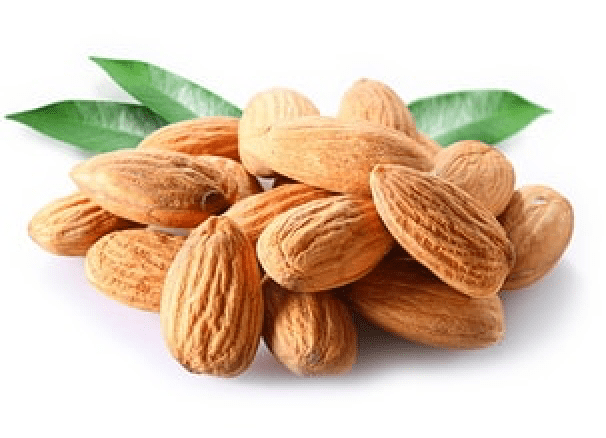
When it comes to nuts, most of them have a good amount of vitamins and minerals, but almonds are best for your gut. They contain probiotic properties, therefore a handful of almonds or almond butter is going to improve your digestive health.
Tip – Dip your apples in almond butter as a healthy snack.
Kefir
Next to yogurt, kefir is probably one of the healthiest and best forms of dairy for your gut health. It is a cross between milk and liquid yogurt, with many different live strains of good bacteria to help improve your digestion.
Tip – Improve your gut health by using kefir for your morning smoothie instead of regular milk.
Sprouted Grain and Sourdough Bread
When it comes to bread, you don’t need to skip it entirely to improve your gut, unless you are sensitive to wheat or gluten. However, you do want to choose the right varieties to help your digestion. This includes both sprouted grain bread and sourdough bread.
Sprouted grain bread is much less processed and contains more of the actual whole grains it promises. It is much gentler on your stomach than other types of wheat bread. Sourdough bread is ideal if you have a sensitive stomach but still want bread. Many people with IBS can still eat sourdough.
Tip – Enjoy a piece of sprouted grain bread with avocado and egg for a well-balanced breakfast of carbs, fiber, fat, and protein.
Bone Broth
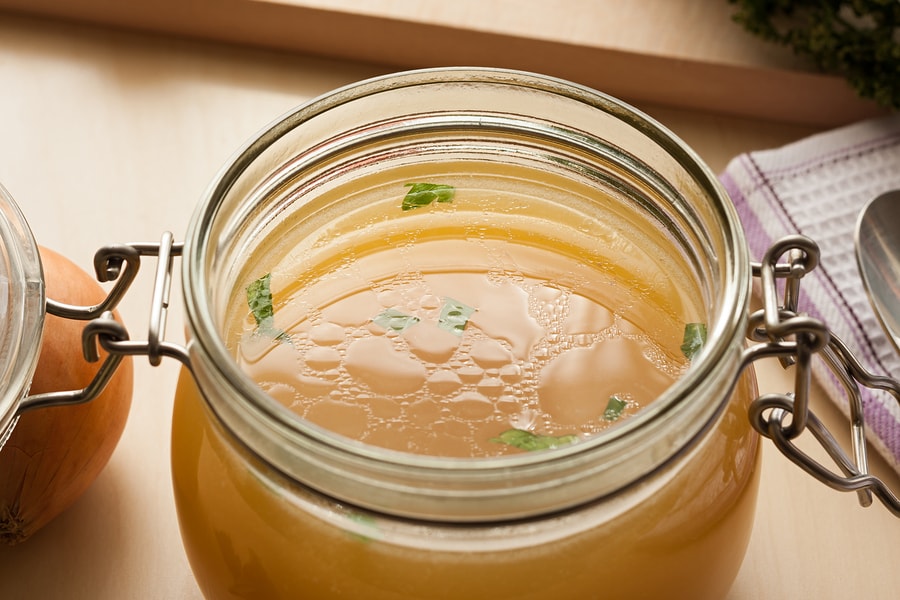
This is so amazing for your health, containing dozens of vitamins and minerals, and collagen to help your bones and skin. You can use bone broth in your soup and other dishes, or just heat it up and drink it like you would regular broth.
Tip – Add bone broth to your gravy or soup to make it more flavorful and nutritious.
How to Make Healthy Bone Broth
High-Fiber Foods
In addition to those already mentioned, foods high in fiber are really good for your gut health. This includes a lot of whole grains, fruits, and vegetables, like:
- Whole wheat and whole grain bread
- Brown rice
- Beans
- Lentils
- Apples
- Green peas
- Artichokes
- Brussel sprouts
Tip – Increase your fiber slowly, otherwise you might deal with a lot of bloating and gas.
Anti-Inflammatory Foods
Lastly, you have your foods that are known for being anti-inflammatory, which can also help your gut if you struggle with gas and bloating. Some already mentioned include almonds and fish oil. More anti-inflammatory foods that are good for your gut include:
- Walnuts
- Tomatoes
- Peppers
- Berries
- Grapes
- Flaxseed
The Worst Foods for Your Gut
Now for the foods that might not be the best for your gut. Keep in mind that some of these are healthy and nutrient-dense foods, but many people have sensitivities to them when it comes to their gut. For you, this might mean you can only eat a small amount of them at a time, you eat them sparingly, or you need to skip them entirely.
As always, you should listen to your body when deciding if these foods need to be avoided or not.
The worst foods for your gut include:
Processed Foods
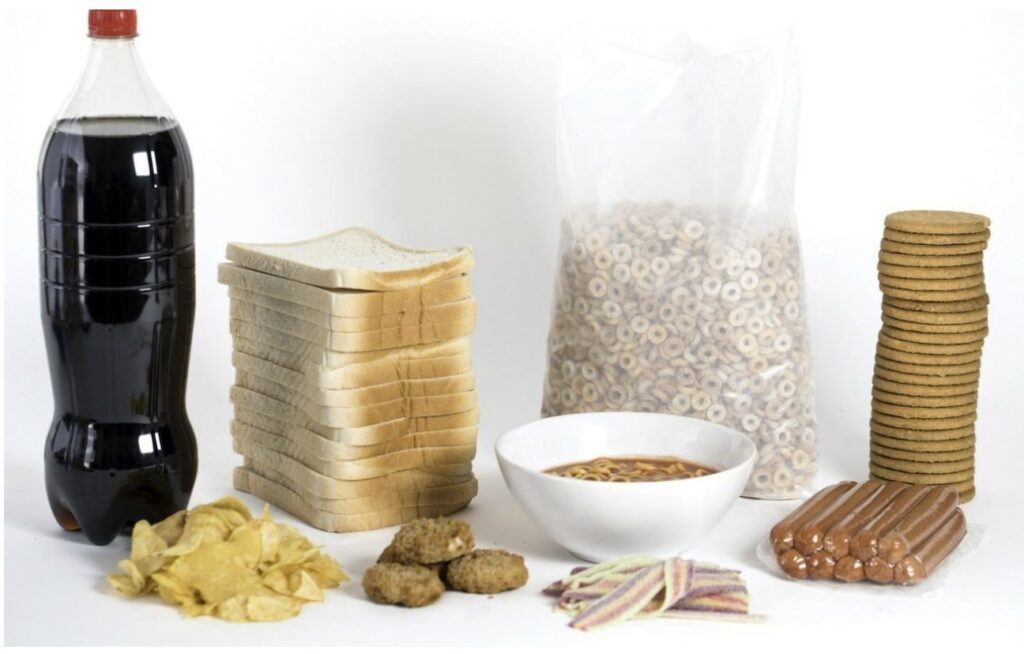
Naturally, processed foods are going to be high on this list. While you don’t need to eat a completely, 100 percent clean diet, it is a good idea to reduce how often you eat processed foods. How do you know it’s processed? Typically, if it doesn’t come in its whole form, like anything packaged or frozen, it has at least some processing done to it.
Tip – Try skipping excessively processed foods for a few weeks, then see if your gut health improves.
Fried Foods
Fried and fatty foods can also be really hard on your stomach. Many people don’t have an easy time digesting them, leading to gas, bloating, and stomach cramps. If you have medical conditions like gastritis or acid reflux, these high-fat foods can cause a lot more discomfort for you.
Tip – Save your fried foods for the occasional treat, not as a regular occurrence.
Saturated Fats
In addition to fried foods, there is also a category of foods with a lot of saturated fat. Think about foods like full-fat cream and butter. Saturated fat can also be found in a lot of processed and fried foods, especially if you eat out at restaurants or fast food joints. Saturated fat can also disturb the good bacteria in your gut.
Tip – Use olive oil instead of butter when cooking.
Red Meat
When eaten in moderation, red meat like beef and pork should be okay. But if you are eating an excess amount of it, you might notice the adverse effects in your gut. Red meat can negatively affect your gut microbiome, and lead to a lot of digestive issues in the future. Plus, it is also harmful to your cardiovascular health.
Tip – To get the flavor of beef, combine ground beef and ground turkey for a lower-fat option that is still tasty.
Alcohol

You might notice that the older you get, the harder it is to handle alcoholic beverages if you have more than one. This is a good sign that it is time to cut back or consider quitting.
Tip – Consider making non-alcoholic versions of your favorite drinks, such as margaritas and daiquiris.
Artificial Sweeteners
If you have ever eaten something that claimed to be “sugar-free” chances are high that it used artificial sweeteners. Some alternative sweeteners are more natural, like Stevia and Monk Fruit, and might be very gentle on your stomach. But, you do want to avoid sweeteners like sucralose, sorbitol, maltitol, and aspartame.
Tip – Choose the versions of sweets with real sugar or natural sweeteners, instead of “diet” or “sugar-free”.
Citrus
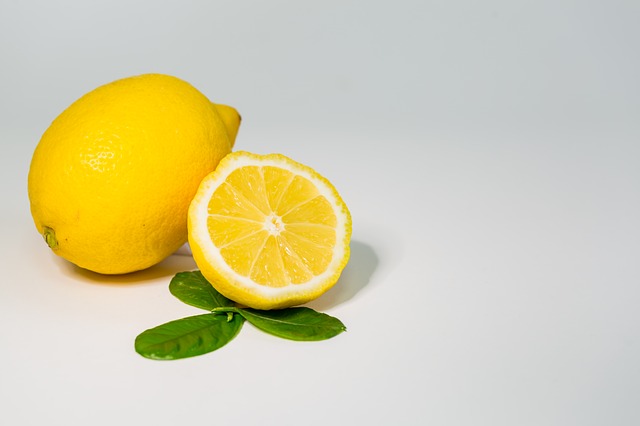
Many citrus fruits like oranges, lemons, and grapefruit are really healthy and contain a lot of antioxidants and vitamins. Unfortunately, some people are overly sensitive to them, and their gut does not handle them well. If you are dealing with gut issues, consider reducing the citrus fruits in your diet and switch to fruits like bananas and cantaloupe instead.
Tip – You might also be sensitive to other acidic foods like tomatoes.
Vegetables
These vegetables are another food that is good for you, but not always kind to your gut. You don’t need to remove them from your diet completely, but if you have a lot of gas and bloating, reducing them is probably a good idea.
Cruciferous vegetables include:
- Broccoli
- Cauliflower
- Cabbage
- Brussels sprouts
- Bok Choy
- Radish
Spicy Foods
Last are your spicy foods. Again, these aren’t always bad for you, and you might even have a strong stomach that can handle them. But if you have gut issues and can’t figure out the cause, notice how you feel after eating something spicy.
Capsaicin is an ingredient in hot chili peppers that are often linked with the digestive issues people experience with spicy foods.
Tip – Start lowering the spice in your food slowly, gradually moving from hot to medium, then mild.
Not only does following this list of good and bad foods for your gut help your digestive health, but it can help you have a more balanced diet.
Probiotic Supplements Encourage Gut Health
A good brain Health + Probiotic supplement can be a good way to help encourage the growth of beneficial bacteria in the intestines for better physical and mental health.
Physicians often recommend patients who are taking antibiotics take probiotics as well.
Antibiotics tend to kill off the beneficial bacteria in the intestinal tract, and probiotics help counteract this effect by fostering the growth of good bacteria.
Taking a probiotic supplement can also help individuals with a number of intestinal conditions, as well as improve mental health conditions such as anxiety and depression.
I

I
Don't forget to follow us on Pinterest. Thank you for your time and reading.
The information presented here is in no way meant to serve as medical advice. It is merely information and opinion. All information, content, and material of this website is for informational purposes only and are not intended to serve as a substitute for the consultation, diagnosis, and/or medical treatment of a qualified physician or health care provider. If you are experiencing symptoms of any kind, please consult with your physician.

